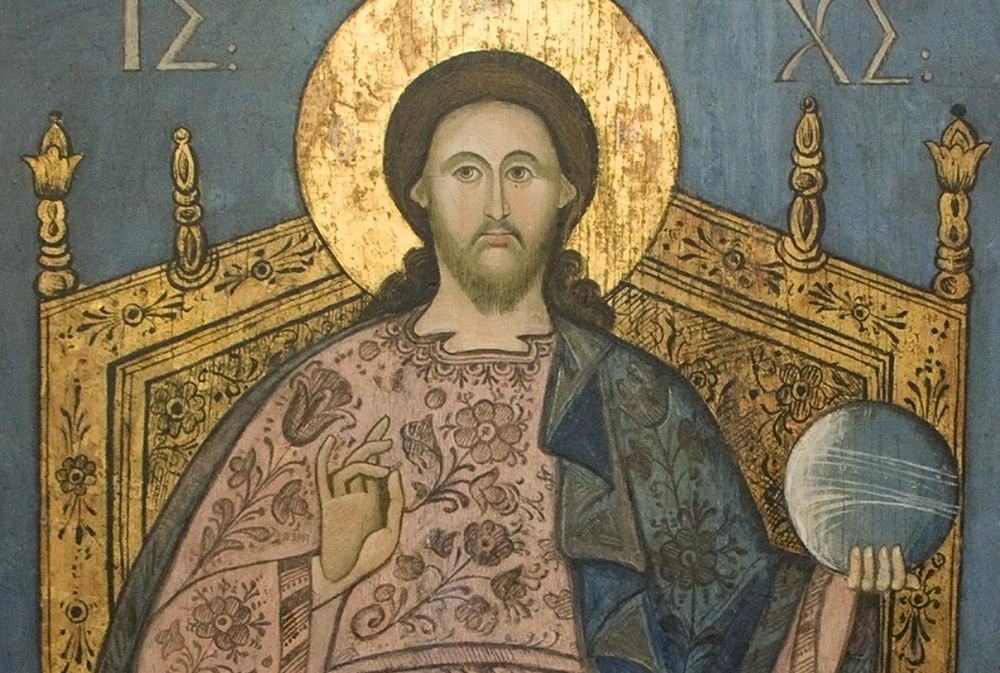
(Wikimedia Commons/Szilas)
When I was a child, the feast in the church I most enjoyed was Christ the King. In Marathi it is called Khrista Raja. I have been thinking of it again as we approach Epiphany. What I remember most is the long procession from the marketplace, the first Communion children dressed in their white robes and carrying white candles, looking like "walky-talky angels" had appeared on earth.
My favorite memory from the long procession is the Marathi song played on violin:
Bharat mata lekarn sahit, anusara khrista raya, kamorihun Everest tokas, khrista Vijaya gajav geet. guranchya gothi janmala, dev asun bal zala, mendhpalane tula janile, raja mhanun tula namile.
Meaning,
O Mother India, along with your children imitate Christ the King, from Cape Comorin [today, Kanyakumari, South India] to the peak of Mount Everest, sing his victory songs. Though in a God form you became a humble child, born in a stable, shepherds recognized you, and bowed down as their Kin[g].
As I studied for the Deeptime Leadership Program "Encountering the Universe: An Introduction to the New Cosmology," I became aware that Jesus was perfectly aligned with what Thomas Berry said, "The universe is a communion of subjects rather than a collection of objects." My meditation on the kinship of Christ the Anointed urged me to transcend the imitation of the historical Jesus and move to reflect on the Cosmic Christ, pervading the entire universe.
Last year on Nov. 20, the feast of Christ the King, I reflected on "Christ the Kin," and as we celebrate Epiphany, some of my thoughts still apply.
What dawned on me was the realization that we are more than just a bodily mass — we are divine beings, who inherit divinity through Jesus' kinship: synchronized resemblance. Jesus was fully aware of his inner essence — a perfect synchronization of flesh, emotions, intelligence and spirit.
The human concept of monarchy still holds relevance for those who are not aware of the presence of the One consciousness that pervades the entire universe. Because the most essential thing in life — the one thing that really matters — is self-realization, which means knowing who you are beyond your surface self, your name, physical form, your past and future.
Being eternal in time and having dominion over the whole universe, the kinship of Christ is qualitatively different from the monarchies of this world, and supersedes all of them.
We are living in a cyber era, grappling with avaricious leanings that insist we adhere to the values of the earthly kingdom. But I would like to think about it not as a kingdom, but as the kinship of Jesus Christ the Kin, which he expressed through his itinerant life with his disciples, without having to build institutions.
Jesus was fully aware of this subjectivity, and there was a living sense of peace abiding in him that made him connect with every being as his kin.
Knowing Jesus, we cannot become an object promoting an illusionary egoic identity of ourselves. Our awareness of our subjectivity must lead us to free ourself from self-seeking situations, places and conditions.
Advertisement
I realized that living on this planet with the sense of the post-resurrection cosmic Christ, we are fully connected with every being. I myself experienced vibrant aliveness and peacefulness by letting go of my ego and enjoying the playfulness of the cosmic dance of Sophia, becoming dance itself.
As the experience of "Pure consciousness is bliss" began to manifest itself through my lifestyle, the words of St. Teresa of Avila began to ring true:
Christ has no body now but yours. No hands, no feet on earth but yours.
Yours are the eyes through which he looks compassion on this world.
Yours are the feet with which he walks to do good.
Yours are the hands through which he blesses all the world.
Yours are the hands, yours are the feet, yours are the eyes, you are his body.
Christ has no body now on earth but yours.
I started gaining insights from recognizing myself in everything, like how seeds die and rise to new life as fruits and flowers. I am no longer an entity with a heavy past that became a screen of concepts through which I had to interpret every experience.
Every act of interaction with the cosmic kinship community brought me wisdom and peace. My call to follow Jesus Christ the Kin became an odyssey with possibilities.
Accepting Christ the Kin is a spiritual battle that knits life together for every cosmic being so that we are all safe forever. This battle demands from us an ethical maturity, an all-embracing spiritual witness and collective kinship.
The radiant night skies speak to the interwoven connections and kinship of everyone. Our sense of kinship as human family only is very narrow and will deprive us of the universal concern that drives us beyond ourselves to the center of cosmic being.
The challenge today to become Catholics in the true sense of the word is not to be confined by geographical parish boundaries but to harken to the call of synodality. Referring to "Enlarge the space of your tent" (Isaiah 54:2), the working document for the synod says, "This is how many reports envision the church: an expansive, but not homogeneous dwelling, capable of sheltering all, but open, letting in and out, and moving toward embracing ... all of humanity" — including nature.
Thus, we find the kindom of God not in institutions where a manmade hierarchy is the norm, but we find God in the entire universe, the source and summit of our daily sustenance.
Jesus as our Kin, born in flesh, shares our human affinity and offers us his divine nature. As the body of Christ, we embrace our divine heritage with him and proclaim his kindom of justice, peace and righteousness.
"All things were created through him and for him" (Colossians 1:16). Even though we are individual human beings, we must seek a sense of kinship to life that transcends all particulars.
The sacredness of creation and of life is our point of reference to kinship. Given the enormity of anguish around us, our sense of interactive subjectivity will expand our consciousness into a wider kinship of all. Our profound kindness, cognizant caring, and being in the midst of nature will help us evolve, by setting us free to set others free.
Our collective human capacity to evolve is diminishing rapidly. When our ancestral reservoir of enduring kinship is empty, Adam Bucko (co-author of Occupy Spirituality) says we find that "our world is in crisis, and we need road maps that can ground us in wisdom, inspire us to action, and help us gather our talents in service of compassion and justice."
My hope is that our kinship under Christ will drive us to join hands to pray that the recently concluded climate change conference in Egypt (COP27) will bear fruit for the highest good of all!
Perhaps the Epiphany of the kinship of Jesus the Christ, the Prince of Peace will lead us from pathological individualism to the collective consciousness that we cannot have outer peace without inner peace!







